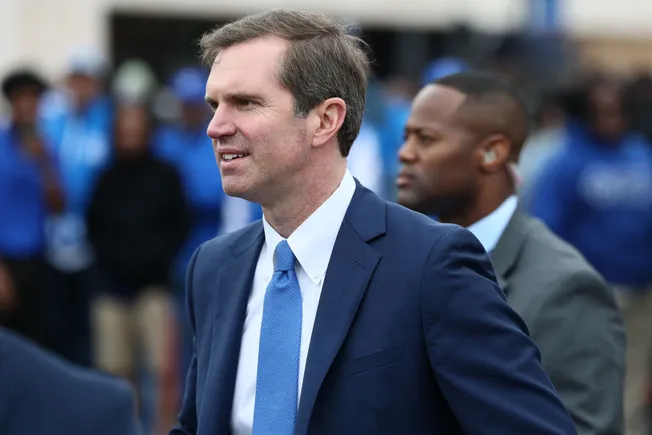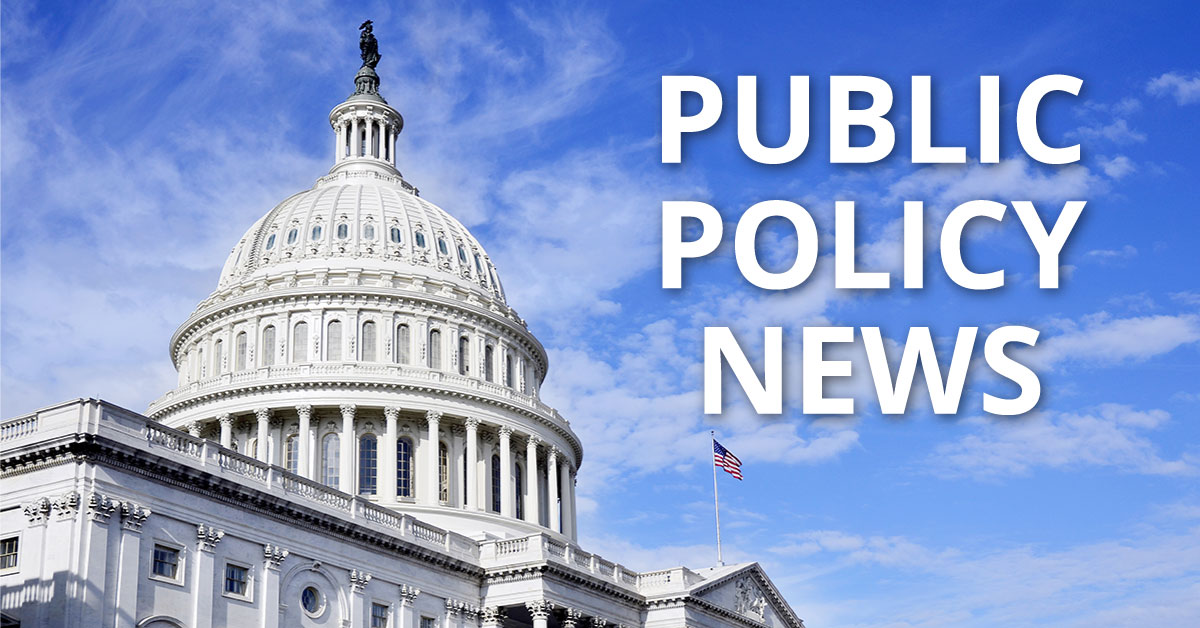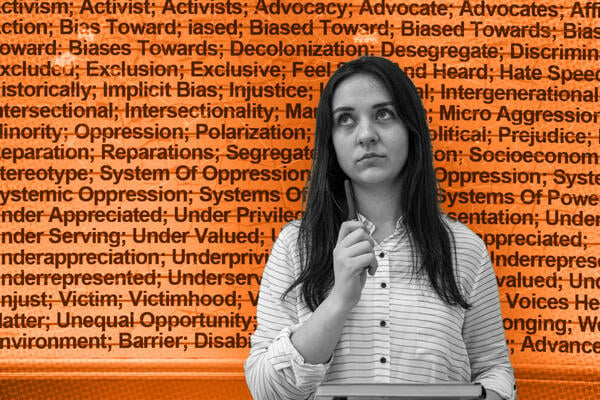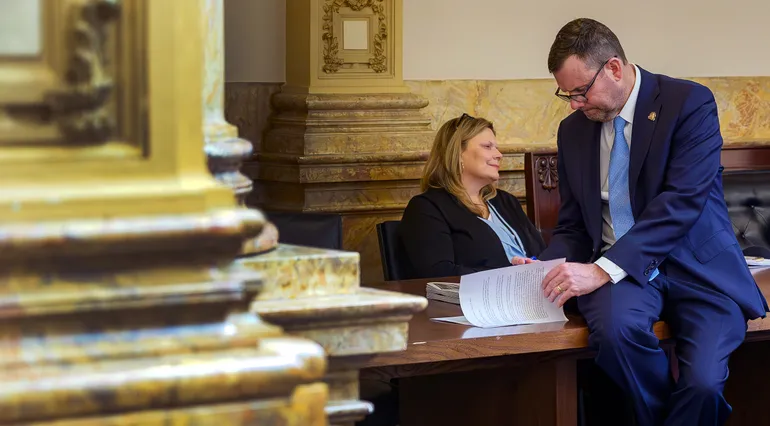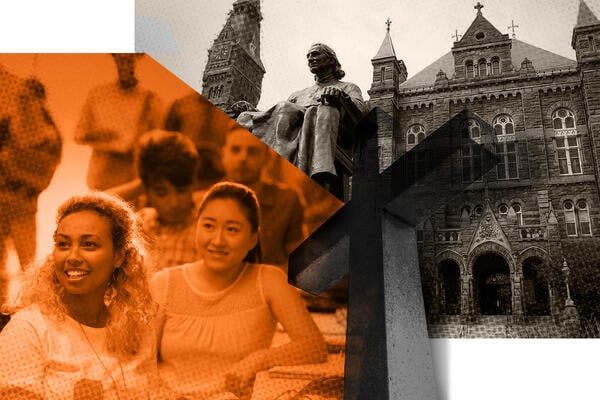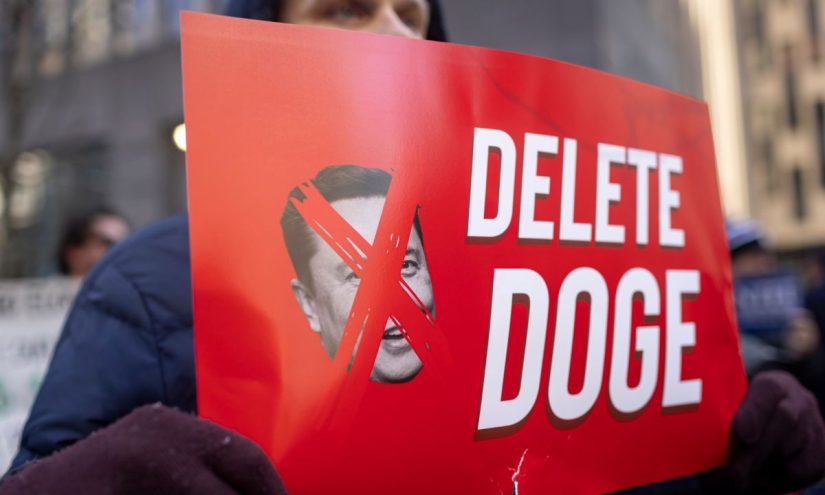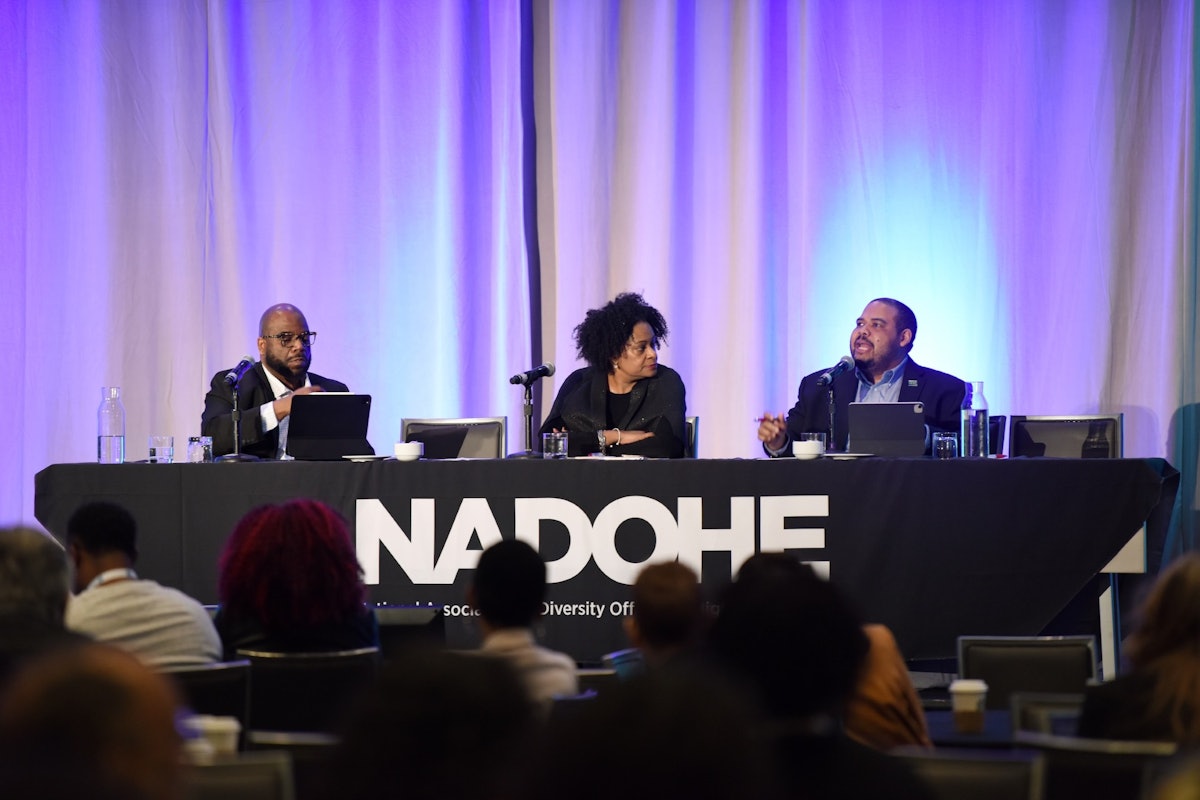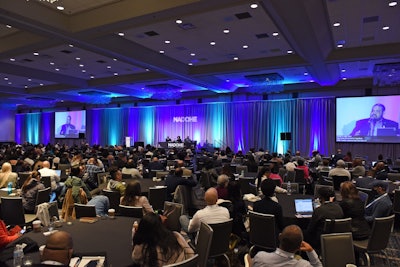Get stories like this delivered straight to your inbox. Sign up for The 74 Newsletter
When teens and young adults with disabilities in California’s Poway Unified School District heard about a new opportunity to get extra help planning for life after high school, nearly every eligible student signed up.
The program, known as Charting My Path for Future Success, aimed to fill a major gap in education research about what kinds of support give students nearing graduation the best shot at living independently, finding work, or continuing their studies.
Students with disabilities finish college at much lower rates than their non-disabled peers, and often struggle to tap into state employment programs for adults with disabilities, said Stacey McCrath-Smith, a director of special education at Poway Unified, which had 135 students participating in the program. So the extra help, which included learning how to track goals on a tool designed for high schoolers with disabilities, was much needed.
Charting My Path launched earlier this school year in Poway Unified and 12 other school districts. The salaries of 61 school staff nationwide, and the training they received to work with nearly 1,100 high schoolers with disabilities for a year and a half, was paid for by the U.S. Department of Education.
Jessie Damroth’s 17-year-old son Logan, who has autism, attention deficit hyperactivity disorder, and other medical needs, had attended classes and met with his mentor through the program at Newton Public Schools in Massachusetts for a month. For the first time, he was talking excitedly about career options in science and what he might study at college.
“He was starting to talk about what his path would look like,” Damroth said. “It was exciting to hear him get really excited about these opportunities. … He needed that extra support to really reinforce that he could do this.”
Then the Trump administration pulled the plug.
Charting My Path was among more than 200 Education Department contracts and grants terminated over the last two weeks by the Trump administration’s U.S. DOGE Service. DOGE has slashed spending it deemed to be wasteful, fraudulent, or in service of diversity, equity, inclusion, and accessibility goals that President Donald Trump has sought to ban. But in several instances, the decision to cancel contracts affected more than researchers analyzing data in their offices — it affected students.
Many projects, like Charting My Path, involved training teachers in new methods, testing learning materials in actual classrooms, and helping school systems use data more effectively.
“Students were going to learn really how to set goals and track progress themselves, rather than having it be done for them,” McCrath-Smith said. “That is the skill that they will need post-high school when there’s not a teacher around.”
All of that work was abruptly halted — in some cases with nearly finished results that now cannot be distributed.
Every administration is entitled to set its own priorities, and contracts can be canceled or changed, said Steven Fleischman, an education consultant who for many years ran one of the regional research programs that was terminated. He compared it to a homeowner deciding they no longer want a deck as part of their remodel.
But the current approach reminds him more of construction projects started and then abandoned during the Great Recession, in some cases leaving giant holes that sat for years.
“You can walk around and say, ‘Oh, that was a building we never finished because the funds got cut off,’” he said.
DOGE drives cuts to education research contracts, grants
The Education Department has been a prime target of DOGE, the chaotic cost-cutting initiative led by billionaire Elon Musk, now a senior adviser to Trump.
So far, DOGE has halted 89 education projects, many of which were under the purview of the Institute of Education Sciences, the ostensibly independent research arm of the Education Department. The administration said those cuts, which included multi-year contracts, totaled $881 million. In recent years, the federal government has spent just over $800 million on the entire IES budget.
DOGE has also shut down 10 regional labs that conduct research for states and local schools and shuttered four equity assistance centers that help with teacher training. The Trump administration also cut off funding for nearly 100 teacher training grants and 18 grants for centers that often work to improve instruction for struggling students.
The total savings is up for debate. The Trump administration said the terminated Education Department contracts and grants were worth $2 billion. But some were near completion with most of the money already spent.
An NPR analysis of all of DOGE’s reported savings found that it likely was around $2 billion for the entire federal government — though the Education Department is a top contributor.
On Friday, a federal judge issued an injunction that temporarily blocks the Trump administration from canceling additional contracts and grants that might violate the anti-DEIA executive order. It’s not clear whether the injunction would prevent more contracts from being canceled “for convenience.”
Mark Schneider, the recent past IES director, said the sweeping cuts represent an opportunity to overhaul a bloated education research establishment. But even many conservative critics have expressed alarm at how wide-ranging and indiscriminate the cuts have been. Congress mandated many of the terminated programs, which also indirectly support state and privately funded research.
The canceled projects include contracts that support maintenance of the Common Core of Data, a major database used by policymakers, researchers, and journalists, as well as work that supports updates to the What Works Clearinghouse, a huge repository of evidence-based practices available to educators for free.
And after promising not to make any cuts to the National Assessment of Educational Progress, known as the nation’s report card, the department canceled an upcoming test for 17-year-olds that helps researchers understand long-term trends. On Monday, Peggy Carr, the head of the National Center for Education Statistics, which oversees NAEP, was placed on leave.
The Education Department did not respond to questions about who decided which programs to cut and what criteria were used. Nor did the department respond to a specific question about why Charting My Path was eliminated. DOGE records estimate the administration saved $22 million by terminating the program early, less than half the $54 million in the original contract.
The decision has caused mid-year disruptions and uncertainty.
In Utah, the Canyons School District is trying to reassign the school counselor and three teachers whose salaries were covered by the Charting My Path contract.
The district, which had 88 high schoolers participating in the program, is hoping to keep using the curriculum to boost its usual services, said Kirsten Stewart, a district spokesperson.
Officials in Poway Unified, too, hope schools can use the curriculum and tools to keep up a version of the program. But that will take time and work because the program’s four teachers had to be reassigned to other jobs.
“They dedicated that time and got really important training,” McCrath-Smith said. “We don’t want to see that squandered.”
For Damroth, the loss of parent support meetings through Charting My Path was especially devastating. Logan has a rare genetic mutation that causes him to fall asleep easily during the day, so Damroth wanted help navigating which colleges might be able to offer extra scheduling support.
“I have a million questions about this. Instead of just hearing ‘I don’t know’ I was really looking forward to working with Joe and the program,” she said, referring to Logan’s former mentor. “It’s just heartbreaking. I feel like this wasn’t well thought out. … My child wants to do things in life, but he needs to be given the tools to achieve those goals and those dreams that he has.”
DOGE cuts labs that helped ‘Mississippi Miracle’ in reading
The dramatic improvement in reading proficiency that Carey Wright oversaw as state superintendent in one the nation’s poorest states became known as the “Mississippi Miracle.”
Regional Educational Laboratory Southeast, based out of the Florida Center for Reading Research at Florida State University, was a key partner in that work, Wright said.
When Wright wondered if state-funded instructional coaches were really making a difference, REL Southeast dispatched a team to observe, videotape, and analyze the instruction delivered by hundreds of elementary teachers across the state. Researchers reported that teachers’ instructional practices aligned well with the science of reading and that teachers themselves said they felt far more knowledgeable about teaching reading.
“That solidified for me that the money that we were putting into professional learning was working,” Wright said.
The study, she noted, arose from a casual conversation with researchers at REL Southeast: “That’s the kind of give and take that the RELs had with the states.”
Wright, now Maryland state superintendent, said she was looking forward to partnering with REL Mid-Atlantic on a math initiative and on an overhaul of the school accountability system.
But this month, termination letters went out to the universities and research organizations that run the 10 Regional Educational Laboratories, which were established by Congress in 1965 to serve states and school districts. The letters said the contracts were being terminated “for convenience.”
The press release that went to news organizations cited “wasteful and ideologically driven spending” and named a single project in Ohio that involved equity audits as a part of an effort to reduce suspensions. Most of the REL projects on the IES website involve reading, math, career connections, and teacher retention.
Jannelle Kubinec, CEO of WestEd, an education research organization that held the contracts for REL West and REL Northwest, said she never received a complaint or a request to review the contracts before receiving termination letters. Her team had to abruptly cancel meetings to go over results with school districts. In other cases, reports are nearly finished but cannot be distributed because they haven’t gone through the review process.
REL West was also working with the Utah State Board of Education to figure out if the legislature’s investment in programs to keep early career teachers from leaving the classroom was making a difference, among several other projects.
“This is good work and we are trying to think through our options,” she said. “But the cancellation does limit our ability to finish the work.”
Given enough time, Utah should be able to find a staffer to analyze the data collected by REL West, said Sharon Turner, a spokesperson for the Utah State Board of Education. But the findings are much less likely to be shared with other states.
The most recent contracts started in 2022 and were set to run through 2027.
The Trump administration said it planned to enter into new contracts for the RELs to satisfy “statutory requirements” and better serve schools and states, though it’s unclear what that will entail.
“The states drive the research agendas of the RELs,” said Sara Schapiro, the executive director of the Alliance for Learning Innovation, a coalition that advocates for more effective education research. If the federal government dictates what RELs can do, “it runs counter to the whole argument that they want the states to be leading the way on education.”
Some terminated federal education research was nearly complete
Some research efforts were nearly complete when they got shut down, raising questions about how efficient these cuts were.
The American Institutes for Research, for example, was almost done evaluating the impact of the Comprehensive Literacy State Development program, which aims to improve literacy instruction through investments like new curriculum and teacher training.
AIR’s research spanned 114 elementary schools across 11 states and involved more than 23,000 third, fourth, and fifth graders and their nearly 900 reading teachers.
Researchers had collected and analyzed a massive trove of data from the randomized trial and presented their findings to federal education officials just three days before the study was terminated.
“It was a very exciting meeting,” said Mike Garet, a vice president and institute fellow at AIR who oversaw the study. “People were very enthusiastic about the report.”
Another AIR study that was nearing completion looked at the use of multi-tiered systems of support for reading among first and second graders. It’s a strategy that helps schools identify and provide support to struggling readers, with the most intensive help going to kids with the highest needs. It’s widely used by schools, but its effectiveness hasn’t been tested on a larger scale.
The research took place in 106 schools and involved over 1,200 educators and 5,700 children who started first grade in 2021 and 2022. Much of the funding for the study went toward paying for teacher training and coaching to roll out the program over three years. All of the data was collected and nearly done being analyzed when DOGE made its cuts.
Garet doesn’t think he and his team should simply walk away from unfinished work.
“If we can’t report results, that would violate our covenant with the districts, the teachers, the parents, and the students who devoted a lot of time in the hope of generating knowledge about what works,” Garet said. “Now that we have the data and have the results, I think we’re duty-bound to report them.”
This story was originally published by Chalkbeat. Chalkbeat is a nonprofit news site covering educational change in public schools. Sign up for their newsletters at ckbe.at/newsletters.
Get stories like these delivered straight to your inbox. Sign up for The 74 Newsletter

